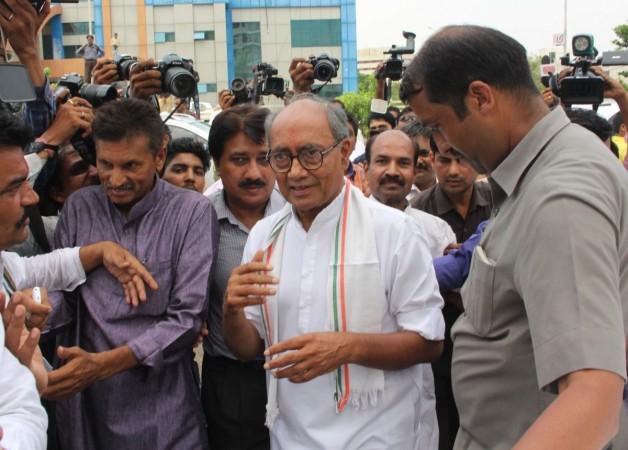
A lot has been written about the Indian National Congress's Himalayan failure in the recent Assembly elections in five states.
While the Congress lost the elections outright in Uttar Pradesh and Uttarakhand, it failed to form the governments in Goa and Manipur, despite finishing as the largest party. The only state where the result went clearly in its favour was Punjab.
Also read: While Congress sinks, the party's sycophants take cover in 'morality' tactic to please the Gandhis
These losses have seen the Grand Old Party rapidly losing its relevance in India, and the leadership of party's vice-president Rahul Gandhi has come under extreme scrutiny.
Kishore Chandra Deo, a former UPA minister, has also said that Rahul needs to get rid of a dozen people who lack accountability. The eagerness of a number of leaders, who have been in charge of states where the party has failed in recent times, to admit their 'moral responsibility' for defeats has also come under suspicion.
According to annoyed sections of the party, those leaders are doing so to save their own backs, even if that comes at the expense of the party's future.
Who's the culprit, Rahul Gandhi or the inefficient second-string leaders?
Is Rahul Gandhi the most responsible for the party's disappointing performances in election after election? Or is it those people holding positions of responsibility who are the actual culprits?
Also read: In desperate times, Aam Aadmi Party reaches for controversial alliances
The equation resembles the classic chick and egg conundrum. So let's take a look at the Congress's supporting cast to understand what is really ailing them.
The Gandhis' support system lacks grounding
After the two Gandhis – Sonia and Rahul – at the helm, the Congress's next set of leaders include: Motilal Vora, Ahmed Patel, Ambika Soni, BK Hariprasad, CP Joshi, Digvijaya Singh, Gurudas Kamat, Janardan Dwivedi, Kamal Nath, Madhusudan Mistry and others.
Also reads: Battleground Karnataka: Is the Congress' Southern redoubt in danger of being overrun?
None of these leaders have any identity beyond the shadow of the Gandhis. More managers than leaders, the likes of Digvijaya Singhs, BK Hariprasads and CP Joshis have not helped the Congress move an inch forward.
Singh, for instance, turned the Congress into a laughing stock after failing to garner just four more seats for it to form the government in Goa. Similarly in Manipur, the BJP ran away with the show even before Joshi blinked.
Hariprasad, on the other hand, faced dissent in Odisha as the party bit the dust in local polls. Patel is considered a shrewd politician who remains quietly by Congress insiders, but how much has he helped the party beyond 10, Janpath?
Mistry, another leader in the Congress thinktank from Gujarat, faced a massive loss against Prime Minister Narendra Modi in Vadodara.
Kamat, on the other hand, withdrew from campaigning for the Mumbai civic election last month seemingly to suggest that he did not endorse the party's city unit chief Sanjay Nirupam's style of functioning.
Vora is 89, and by no means a leader with a clean image. Kamal Nath still had a better managerial image, but his removal as the party's Punjab in-charge last year brought an end to that, one believes. Soni, 74, is known for her corporate style of functioning which is not enough to connect to the grassroots. And where is AK Antony?
Ageing, overused and no mass base; can Congress fight with these leaders in their corner?
The Congress's second-string leaders are neither young nor fresh-faced, nor do they posses a mass base or inspire confidence in voters during elections.
The party high command seems reluctant to discard the old guard and try a new one. In fact, the politics of patronage is so strong in the Congress's inner circle that the top brass even prefers to field any of the above-mentioned old guard, most of whom were Young Turks in the era of the Indira, Sanjay and Rajiv.
Deaths of many key leaders have also crippled the Congress
A cocooned leadership, surrounded by an outdated coterie, has been the Congress's bane. Moreover, the deaths of a number of leaders over the last few decades has also seriously hurt the party's grip on the ground. The untimely demises of Madhavrao Scindia, Rajesh Pilot and YS Rajasekhara Reddy have seriously crippled the Congress in states that it once dominated.
The party today needs to urgently get rid of the people who are not doing it any favours, as the former minister has said.
The Congress's bureaucratic functioning is essentially useless because deploying leaders who have zero connect with reality in other states doesn't earn success. The Congress has found this to be true in Goa, Manipur and several other states.
What on earth prompted the party to make Raj Babbar the party's chief in Uttar Pradesh? Is the Congress ready to reward its faceless, but committed, foot soldiers even as it faces an existential crisis?
Young Turks have also failed to deliver
A few years ago, the Congress had quite a few Young Turks standing by Rahul, in the likes of Sachin Pilot, Jyotiraditya Scindia and Priya Dutt. But they have not emerged the leaders one would have expected them to, perhaps because the party has weakened in their respective states, or because they, too, represent the same dynastic culture.
Whatever it is, the Congress stands exposed today.
We do not really know exactly who Deo was referring to when he mentioned the 12 people the party's high command needs to get rid of, but there are certainly a lot of them who really need to be shown the door if the party aspires to make a comeback.









!['Had denied Housefull franchise as they wanted me to wear a bikini': Tia Bajpai on turning down bold scripts [Exclusive]](https://data1.ibtimes.co.in/en/full/806605/had-denied-housefull-franchise-they-wanted-me-wear-bikini-tia-bajpai-turning-down-bold.png?w=220&h=138)



